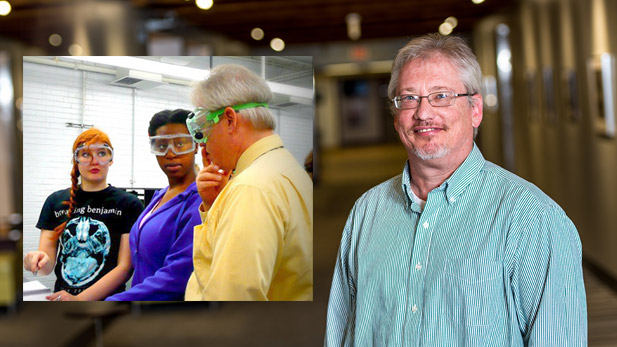Chemistry of Cars Course Connects Everyday Transportation Essential with the Future

Professor Michael Mueller's Chemistry of Cars course has attracted Rose-Hulman students in a diversity of majors, including chemical engineering and computer science.
When an individual thinks about a car, what typically comes to mind is the make and model, sleek look, engine power, and how it drives on the road. Yet a car is so much more than a mode of transpiration moving along the interstate. In fact, chemistry is the real driver of the automobile and the subject of Professor Michael Mueller’s Chemistry of Cars course.
Mueller is a professor of chemistry and biochemistry, and a theoretical and experimental physical chemist who conducts research on combustion chemistry on biofuels. This upper-division course was initially designed for mechanical engineering students. But he quickly saw how it attracted students in a diversity of majors, including chemical engineering and computer science.
“Students are attracted to this course because of the connection between cars and the future, and these students are a big part of developing the future,” says Mueller.
The class explores how a car engine is designed relative to chemistry. Students are given a background in how chemistry interrelates with engine design, exhaust remediation, spark (gas) and diesels engines, motor oil design and coolants. Over the years, the course has evolved to examine electronic vehicles (EVs) and battery technology, and how that is changing the design and chemistry of cars.
The culminating course project is a research report each student writes about something they’re interested in with respect to chemistry of cars. Mueller believes this approach allows students to explore their interested areas in more depth. Some students have focused on superchargers and how they improve the chemistry of combustion. Students interested in EVs and modern technology focus on the battery and infrastructure changes necessary for EVs to gain more prevalence in society.
Mueller enjoys teaching this class because it illustrates how chemistry is applied in everyday life, and in a practical and interesting way.
“Chemistry is part of engineering, and we really want students to appreciate how chemistry will be a part of the solution to whatever we do in terms of energy, infrastructure and transportation,” he says.
Mueller’s personal interest in the chemistry of cars began as a graduate student at University of Texas at Austin when he studied combustion chemistry. Through his supervising professor, Mueller worked with General Motors. At that time, the company was looking for ways to design diesel engines that reduced soot emission, and Mueller was part of that research team.
Through his work at Rose-Hulman over the years, Mueller has worked with several students to conduct several research projects on biofuels. For example, he conducted extensive research on the conversion of algae into biofuel. He also advised a mechanical engineering student who wanted to create a business that would take waste streams and turn them into fuel. The student had the idea to build a business around collecting trap grease from restaurants. Because restaurants must dispose of the grease (they cannot simply dump it in sewage system), Mueller and his student created a plan to convert trap grease into biofuel. This became the student’s thesis project.
One of Mueller’s more noteworthy research projects was working with a student to develop a two-cycle oil. Two-cycle engines required the mix of oil with gasoline. Mueller’s student developed an oil purely made of vegetables and vegetable oil.
“For that oil to be marketed, we had to test it for hours, to study engine wear and compare it to conventional two-cycle oil,” says Mueller. “We had a bunch of two-cycle engines running non-stop here on [the Rose] campus and we would basically tear the engines apart to test the oils.”
That research project ultimately resulted in a paper and presentation to the Society of Automotive Engineering in Shanghai.